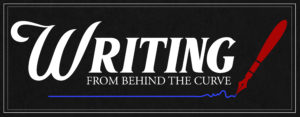Episode Title: The “family biography” is another way to write!
We have come a long way together in the Writing from Behind the Curve blog series, and it is time for me to ask you a question: Notwithstanding all that has been discussed, are you still reluctant, for whatever reasons, to pursue your story idea? Has it become a bridge too far, so to speak? And yet, you have stayed with me all of the way to here, so I have to believe that hidden in there somewhere is a yearning to write something important, maybe just not fiction, and maybe just not now.
 Anemone123 from Pixabay
Anemone123 from Pixabay
There are all kinds of fiction and non-fiction writers, of course, but I have a new writing suggestion for you that will make you the toast of your extended family for generations to come. And although we have spoken only of fiction writing up until now, what I am about to argue for is a brand of non-fiction writing as honest and real as anything ever written by the greatest historians and chroniclers. You no doubt remember how Alex Haley’s Roots taught us a family’s history, as passed down through many years by word of mouth. In Blog #1, I told you about my dear friend Hildy, and how she became a writer for the first time when she was well into her seventies. Another person at that same clinic was Marianne, a friend to both of us. She had a malady that required three full days of kidney dialysis each week, a very tough medical situation. But Marianne was tougher than her condition because she had a very particular thing that she wanted to complete before she died.
 Image from Pixabay
Image from Pixabay
You see, Marianne had a sole grandchild, a teenage grandson, and she worried that he would never know the history of his family, starting several generations back. She hung on through excruciating months to finish a gift for him: a family biography. Unlike today’s DNA tests and ancestry studies, a family biography, she would argue, was the word of one generation speaking directly to all of the generations to follow. It was about much more than just her life; it was also about the family who came before her and concurrent with her. And it was much more than who was married to whom, or where people lived, or what they did for a livelihood. It was also about the nature of the people and what was important to them in their time. It was to describe how the grandson came to be. So I use Marianne’s example as the means for suggesting to those of you who wish to take a different tack in your writing, to consider writing a family biography. Do you have to be a great writer to write a family biography? No, you only have to care enough to do it—for your children, and for all of the children who will follow.
 Image by badski007 from Pixabay
Image by badski007 from Pixabay
When years ago, I watched Ken Burns’ The Civil War television series, the letters sent home by the soldiers were so clearly written that their heartfelt sentiments leapt from the pages. That level of quality writing was essential at a time when the letter was most often the only way to communicate from a distance. Just as with those Civil War letters, it is the written word—those precious historical recordings through the millennia of places, people, and times—that have informed us of life as it was, more than any archaeological dig could ever hope to do. Today, as valuable as DNA tests and ancestry sites have been to the education of where one’s ancestors came from, and where the generations before us lived and worked, nothing can compare to the written history of a family’s life.
 Image by Brandon Robert from Pixabay
Image by Brandon Robert from Pixabay
Imagine what future generations may want to know: First, what you know about every other person in your family, up to great grandma, down to great grandson. What were their personalities like? What were there favorite things to do? What schools, what sports, what religion, what careers, and what marriages helped to form their lives? And that’s not even about you yet. In your heart of hearts, what were your life and times like? Of course, the people you love, but also, your take on the state of technology, politics, travel, culture, and many more things. So, you see, there is much for you to tell in this chronicle of yours. Obviously, such a serious project will require effort and lots of it. It will require the acquisition of your family’s current body of knowledge, probably passed down orally, in Alex Haley fashion, but likely with a lot less quantity than that shared through the generations of his family. It follows, then, that one of your first efforts will be to interview every living member of your family. Before your interviews, however, before you sit down and start writing, you will want to go online and look at the suggested formats for a more systematic and comprehensive memoir that you will be comfortable with. In short, you will want to make sure that your interviews and additional research provide the necessary information to accomplish your aim to create a quality, well-informed document. And, remember, you will be creating a format that will no doubt be followed by any family historians that come after you.
 Image by Astrid Pereira from Pixabay
Image by Astrid Pereira from Pixabay
Just think how much more you would understand about your family’s history, had one of your ancestors, a hundred or two hundred years ago, written about their life and times, and the family they loved. Of course, that assumes that such writings would have survived the ravages of time to get to you in the first place. Today’s digital cloud permanently solves this problem. You can know with confidence that your family biography will allow people, tomorrow and hundreds of years from tomorrow, to look back at what you thought was important to tell them about your extended family. And when you find a much younger family member who will eventually take the reins of this ongoing effort, that will start the linkage to what will hopefully be many future family historians. And think of this: They will all have one thing in common; they will owe their beloved family history to the person who started it all—you. A family biography is a gift worth giving to all who follow. It is a legacy that will hold you forever in the hearts of those who you hold most dear.
*NOTE: This concludes the first ten blogs of Writing from Behind the Curve. The next blog, the first in a new series, is meant to give you insights into my personal writing process for a short story that I am just beginning. While I am unable to share every detail during the course of the story’s writing, I believe I can provide enough of one author’s considerations in tackling a new project to make it valuable; at least, I hope so. To distinguish this series from the first, I will be spelling out blog numbers, rather than using numeric figures. For example, the first blog is “#Eleven.”
All the best,
Dick Franklin
richardsfranklin100@gmail.comI
Dick is author of novels Joshua Rye, Serpent at the Well, and MOLTO GRANDE. Please visit my author’s page at: amazon.com/author/dickfranklin



After readings Molto the immense effort needed to research and write a novel that is a great read cannot be overstated. Happily I really enjoy reading good books. So please keep writing my friend!
Thanks for the comment. Molto Grande was a two-year labor of love.I’m happy that it might show in its reading!